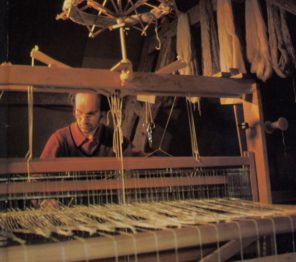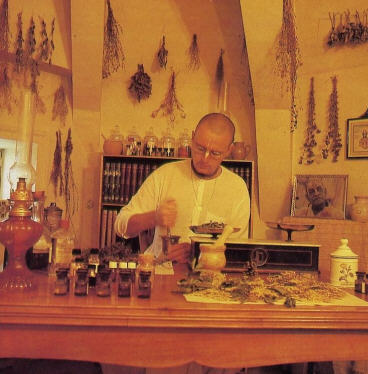The Arts
"Here our ambition is not to become great artists but sincere devotees of God."

Real craftsmanship is, above all else, a spiritual exercise." A mass of spinning clay turns between his fingers. The clay gradually grows into a slender urn that curves and tapers beneath his touch.
"Art is a way of glorifying God. He's in the clay we dig out of the ground. He's in the water that softens it. Our tools are given by Him. Isn't it only right that our work be for His pleasure?"
While speaking, Sadasiva-priya dasa guides the hands of a young man working diligently to mold a vase. Slowly, as the boy repositions his fingers, the vase straightens its posture.
"My father used to teach me like this," Sadasiva-priya says, "When I became a devotee, he gave me one of his potter's wheels so I would continue my crafts."
Sadasiva-priya shared an aspiration with other devotee artisans in France. They wanted to establish workshops where craftspeople could exercise their talents in service to Krsna, the Supreme Lord. In 1975 the Hare Krsna movement purchased a farm in the Tourraine region of central France, and the artisans took charge of several old buildings on the property. They cut wood to renovate floors and roofs and hauled stones from nearby quarries to repair broken walls. Within a year the first ateliers were finished, and the potters and weavers installed their equipment. Word of the artisans group spread, and soon other crafts-people came to the farm and started workshops for painting, design, horticulture, naturopathy, and a factory that produces incense and vegetable-based soap.
"We have many friends who sympathize with our principle of dedicating artistic skills to God's service," says Bhuta-bhavana dasa, who directs the silk-screen and press operation at the farm. Before becoming a devotee he was a student at l'Ecole des Beaux Arts and previous to that a missionary student in Chile.
"I needed to express myself artistically," he says, "but the same lack of substance I had known in the Church came back to haunt me in the theater. My friends and I had mastered many innovative dance forms and dramatic techniques, but we had nothing of value to say to people. The theater itself was void of real meaning."
In 1972 he met devotees on the streets of Paris and soon after began chanting Hare Krsna as a daily meditation. Gradually he adopted the principles of devotional life. He never forgot that he had left the theater to become purified. He wanted his talents to have deeper meaning for people. Like most of the artisans at the New Mayapur farm, he says his artistic abilities have blossomed since he dedicated himself to Krsna conscious practices.
"For a devotee," Bhuta-bhavana explains," every act whether it be weaving cloth or washing dishes is meant to be an offering to God. If we concentrate on our tapestry or painting but neglect to keep Krsna's temple clean, then we have missed the point of devotional service. Here our ambition is not to become great artists but sincere devotees of God."

Avyaya Dasa
The devotees welcome everyone who wants to take part in the crafts work, but only those who agree to follow the devotional principles no meat-eating, intoxication, extramarital sex, or gambling are allowed to live on the farm. Those who are still in the process of adopting these devotional standards are "friends of Krsna," as the devotees call them. Some of Krsna's friends rent homes nearby to make it easier to attend workshops and temple ceremonies. Others, like Ramon Dilley, an artist of some repute in France, have started building country studios on land adjoining the farm.
"We extend ourselves to visitors and friends," Bhuta-bhavana says. "We don't expect that everyone can adjust to a strict devotional life right away, so here is a chance for them to take to spiritual life without having to make a 'leap of faith.' By coming here to exercise their artistic skills, they associate with the devotees, and they learn what to expect if they want to advance further in Krsna consciousness.
Visiting the wood-and-brick homes on the farm property, one sees bedspreads and sitting mats from the weavers' loft. Devotees serve guests their meals in clay bowls, cups, and plates made at the pottery barn. Bhuta-bhavana's silkscreen posters illustrating verses from the Bhagavad-gita and other Vedic scriptures adorn walls and classrooms. Sticks of homemade incense burn long into the night.
"We would like people to recognize through our work that the true creator is God," Bhuta-bhavana explains. "He is the ability in man, the source of all inspiration and intelligence. Our art is merely an imitation of His, a rearranging of elements He has created. If even one person becomes inspired to serve Krsna by seeing our work, we will consider our efforts successful."
